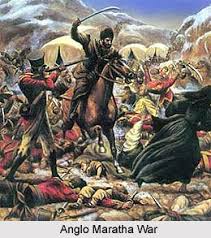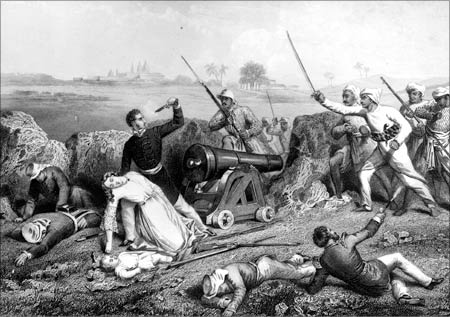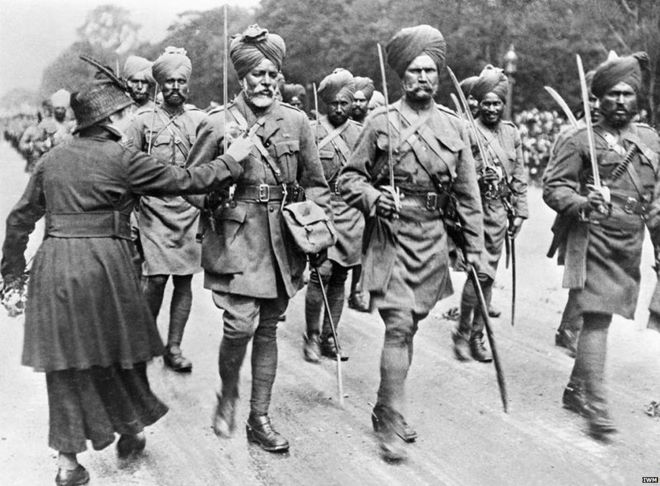.
.
.
The British had not come to India to build railways...not in 1757, or spread civilization and Christian charity. If that was the genuine case there wouldn't have been the liberation war of 1857, or the incessant conflicts around the country for a good deal of time under their rule. This uprising, that uprising and this uprising....the natives were definitely restless under British rule and for good reasons. 30 million Indians died under British rule....so no Christian charity and Western civilization for these people.
The primary purpose of British involvement in India was money and profit.
The propaganda BS about civilization and spreading Christian charity was an elaborate Psy-ops for their own mental sanity in the face of severe cruelty and exploitation of a subjugated race and the prickles of conscience that peered from time to time whilst they lorded over India, AND for the consumption of the gullible natives and their victims.
Anything between $1 trillion to $3 trillion worth of wealth was transferred from India to the UK, funding Britain's Industrial revolution and its colonial wars.
The 'Jewel in the Crown' was so called for nothing.
Those who benefited from the empire's looting were an exclusive group in the UK mainly in the South East and London.
A significant part of the $700 million Britain raised for the Napoleonic wars came from India.
This is partly the reason why Hitler thought that Britain's control of India was the sole cause of its military might.
By the time of the WWI and WWII this was less of a case. Even though 1.5 million Indian volunteers, and 2.5 million volunteers fought for the evil empire. Between 1815--1919 the Indian economy had contracted from being the second largest economy on earth to the 12th largest. This reveals to us the extent of British looting of India, without the saving grace of extensive investment in the country simultaneously.
The railways were built to shift the British Indian army around the country to stamp out the sporadic rebellions.
Most shamefully the country was used as a huge plantation to grow Opium and export it to China.
They are at it again in Afghanistan (Helmand province), but this time with the Americans.
Compensation from the UK is not necessary but the vestiges of the evil British empire should be erased from South Asia.
Indians should speak an Indian language whilst they serve the government of the country.
The INSTITUTIONS of India should be de-colonised starting with the military, police and all else.
India should leave the Commonwealth which is essentially a celebration of the British empire.
Then maybe India will be taken seriously as a country.
Otherwise 'independent' Macaulay brown sahib' India with its high levels of corruption and misgovernance is doing quite well.....with a PPP GDP of $ 8 trillion soon, and the third largest economy on earth.
_________________________________________
India's prime minister endorses call for Britain to pay reparations for colonial rule
Narendra Modi supports impassioned Shashi Tharoor’s call for colonial ruler Britain to make reparations to India
The Telegraph of London
.
India’s prime minister has praised an
opposition MP who made an impassioned appeal for Britain to pay
reparations for 200 years of colonial rule.
.

.

Narendra Modi said Shashi Tharoor’s speech at the Oxford Union, which
was posted online last week, “reflected the feelings of patriotic
Indians” and that he said “the right things at the right place”.
.
.

Mr Tharoor, a Congress MP, writer and former UN under-secretary
general, said that “Britain’s rise for 200 years was financed by its
depredations in India”
“We paid for
our own oppression,” he said “It’s a bit rich to impress, maim, kill,
torture and repress and then celebrate democracy at the end of it.”
.
.
“India's share of the world economy when Britain arrived on its shores was 23 per cent. By the time the British left it was down to below four per cent," Tharoor said in the May 28 debate.
.

"Why? Simply because India had been governed for the benefit of Britain.”
.

Mr Tharoor added that Indians had "literally paid for our own oppression," as by the end of the 19th century they were the world's biggest purchasers of British goods as well as providing employment for highly paid civil servants.
.

“In fact, Britain’s industrial revolution was actually premised upon the de-industrialisation of India,” he said.
.

• David Cameron: Britain caused many of the world's problems
.

The 15-minute speech has been viewed more than 1.5 million times on YouTube and was widely praised by the Indian press.
.

Mr Modi responded to the speech earlier this week, saying: "Tharoor's speech reflected the feelings of patriotic Indians on the issue and showed what impression one can leave with effective arguments by saying the right things at the right place."
.
Mr Tharoor, who has often been criticised by Congress president Sonia Gandhi for praising Mr Modi and his initiatives, also called on Britain to apologise for colonial rule.
.
"As far as I am concerned, the ability to acknowledge a wrong that has been done, to simply say sorry, will go a far, far, far longer way than some percentage of GDP in the form of aid," he said.
.
"What is required, it seems to me, is accepting the principle that reparations are owed."
.
Mr Modi, however, did not say whether he backed Mr Tharoor's demand for an apology. The British High Commission in Delhi declined to comment.
.
Mr Modi is due to visit Britain later this year. The dates of the trip have yet to be finalised.
.
Many in India want Britain to make amends for the wrongs committed during its colonial rule.
.
David Cameron had to face severe criticism during his last trip to India for not apologising for the 1919 Jallianwala Bagh massacre in Amritsar, where hundreds of non-violent pro-independence protesters were shot dead at the behest of Colonel Reginald Dyer.
.
The Prime Minister expressed regret for the massacre during a visit to Amritsar in 2013 and laid a wreath at a memorial, but Indian critics said it was not enough.